Top 20 Store-Bought Guinea Pig Treats To Make Your Piggies Happy in 2024
Today we're taking you on a virtual shopping spree to find the best store-bought guinea pig treats that your little ones will go crazy for!

Guinea pigs are adorable, sociable pets that bring joy to many households. As a pet owner, you want to ensure your furry friend is not only happy but also healthy. One way to spoil your guinea pig is by offering them treats. However, with so many options available, it can be challenging to choose the right ones. This article will guide you through the top 20 store-bought guinea pig treats that are both delicious and nutritious, while also fitting into a well-rounded guinea pig's diet.
Key Takeaways:
- Discover the best store-bought treats that are safe and healthy for your guinea pig.
- Learn how to incorporate treats into your guinea pig's diet without compromising their nutritional needs.
- Understand the importance of moderation and variety when feeding your guinea pig treats.
1. Timothy Hay-Based Treats for Guinea Pigs
Timothy hay is a staple in a guinea pig's diet, providing essential fiber that aids in digestion. Many pet stores offer timothy hay-based treats that combine the benefits of hay with other healthy ingredients. These treats often come in the form of sticks or cubes, making them a fun and engaging snack for your piggy.
2. Vitamin C-Enriched Snacks
Guinea pigs cannot produce vitamin C on their own, so it’s crucial to supplement their diet with vitamin C-rich foods. Guinea pigs cannot produce their own vitamin C and must obtain it from their diet. Look for treats that are fortified with vitamin C to help prevent deficiencies. These can include chewable tablets or treats mixed with vitamin C-rich fruits like bell peppers.
3. Natural Wood Chews
To keep your guinea pig's teeth healthy and trim, natural wood chews are an excellent option. They satisfy the natural urge to gnaw and can prevent dental issues. Ensure the wood is untreated and safe for small animals before adding it to your guinea pig's cage.
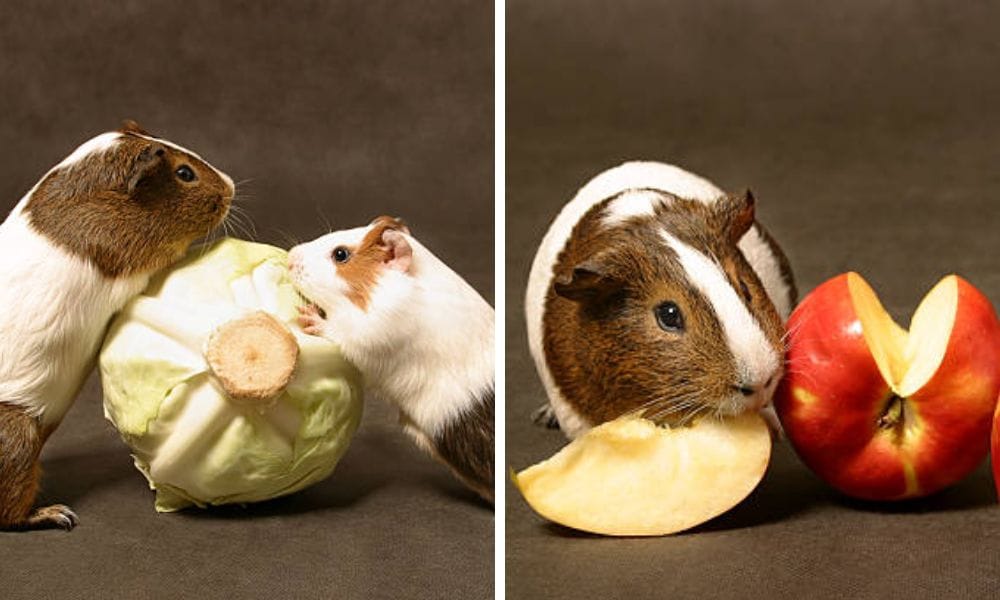
4. Dried Fruit Treats
Dried fruits can be a sweet occasional treat for your guinea pig. However, it’s important to choose fruits with no added sugar or artificial sweeteners. Small pieces of banana or apple are good options, but remember to feed them in moderation due to the high sugar content.
5. Veggie Bites
Fresh vegetables are a significant part of a guinea pig’s diet, and veggie bites from the pet store can be a convenient way to provide these nutrients. Look for treats that contain ingredients like romaine lettuce, carrots, or bell peppers, and avoid those with high calcium content to prevent urinary issues. Many guinea pigs enjoy a variety of vegetables in their diet.
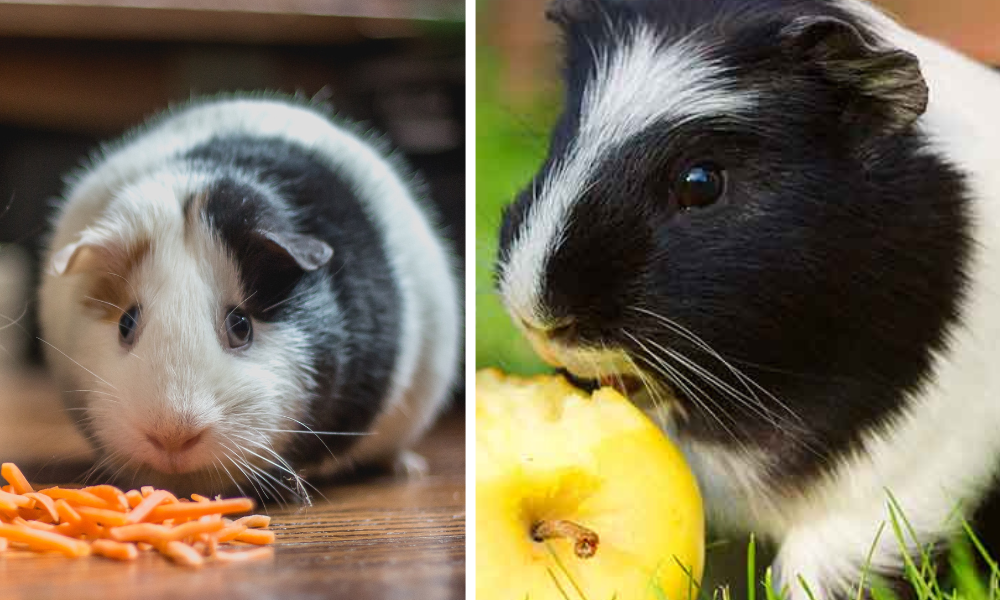
6. Pellet-Based Treats
Pellets are a common part of a guinea pig’s daily diet, but there are also pellet-based treats available. These often include added vitamins and minerals to supplement your guinea pig’s nutritional needs. Choose pellets without high-calorie fillers to maintain a well-balanced diet.
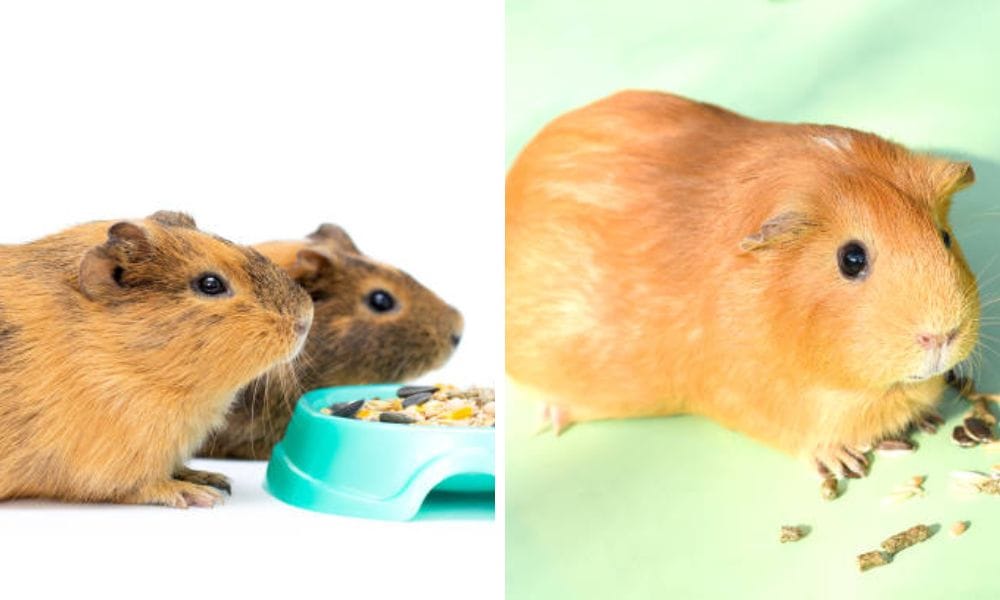
7. Herbal Mixes
Herbal mixes can be a delightful and healthy treat for your guinea pig. These mixes usually contain a variety of dried herbs and flowers that provide different flavors and textures. They can also have health benefits, such as aiding digestion or providing antioxidants.
8. Yogurt Drops
Yogurt drops are a popular treat among small animal owners, but they should be given sparingly. While they can be a tasty reward, they often contain dairy and added sugars, which are not ideal for guinea pigs. If you choose to offer yogurt drops, do so rarely and in very small amounts.
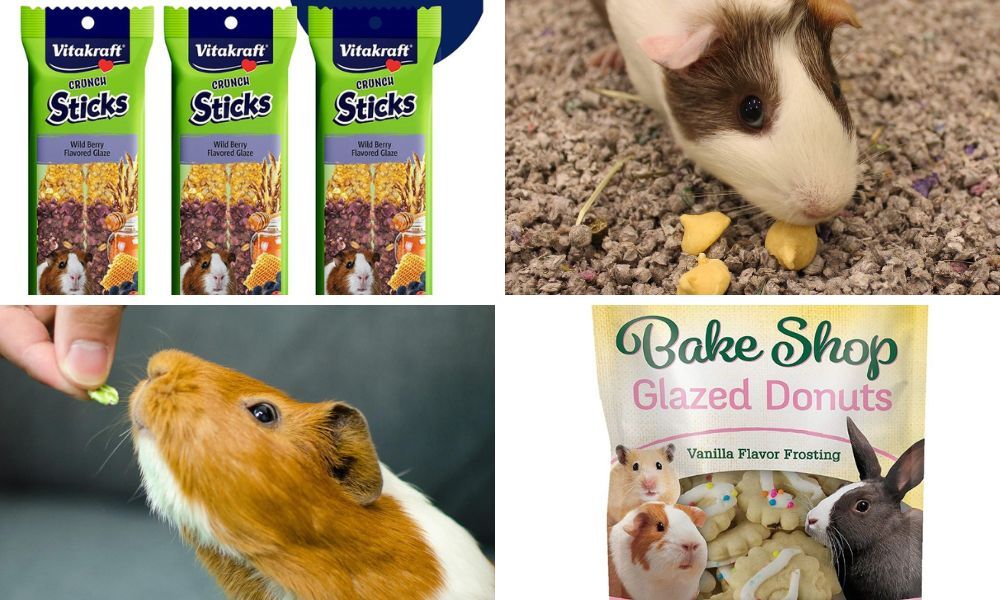
9. Baked Treats
Some pet stores sell baked treats specifically formulated for small animals. These can include cookies or biscuits that are hard and crunchy, helping to wear down your guinea pig's constantly growing teeth. Always check the ingredients to ensure they are safe and healthy.
10. Freeze-Dried Veggies and Fruits
Freeze-dried vegetables and fruits are a convenient way to provide the benefits of fresh produce without the worry of spoilage. They retain most of the nutrients and are a crunchy, fun snack for your guinea pig. Just like with dried fruit, feed these in small amounts due to the concentration of sugars. Be cautious of feeding too many freeze-dried fruits as they can be high in empty calories, which may lead to obesity and other health issues.
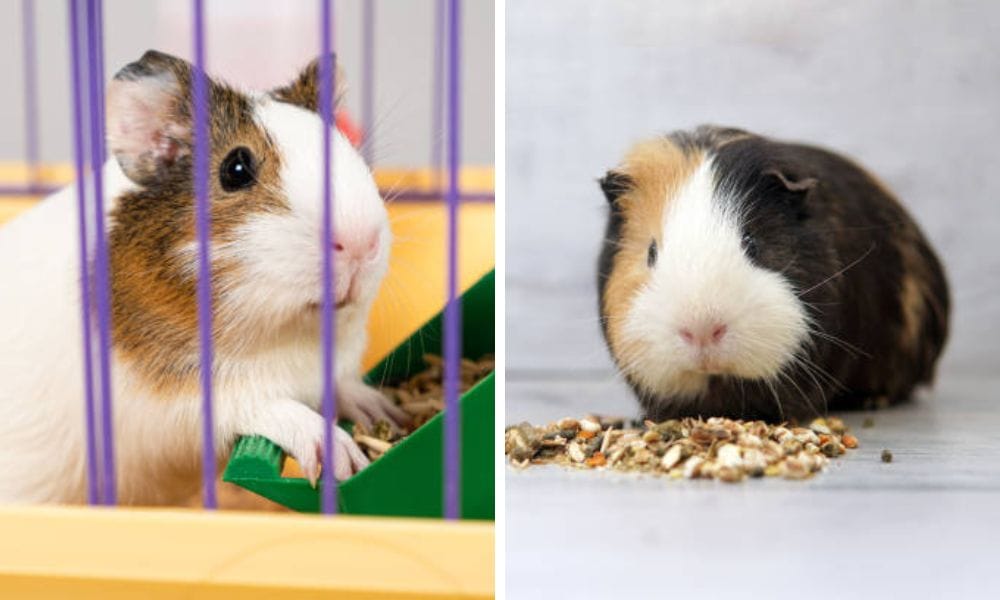
11. Seagrass Twists
Seagrass twists are a natural and edible toy that serves as both a treat and a plaything for guinea pigs. They are made from dried seagrass, which is safe for guinea pigs to chew on and can help satisfy their natural foraging instincts.
12. Loofah Chews
Loofah chews, made from the fibrous skeleton of the loofah plant, provide a unique texture for guinea pigs to gnaw on. They are a natural way to help keep your pet's teeth in check and can be a fun addition to their cage environment.
13. Puffed Rice Treats
Puffed rice treats are light and can be a good option for an occasional treat. They don't contain much nutritional value, so they should be given sparingly and not replace a guinea pig's main diet of fresh hay and vegetables.
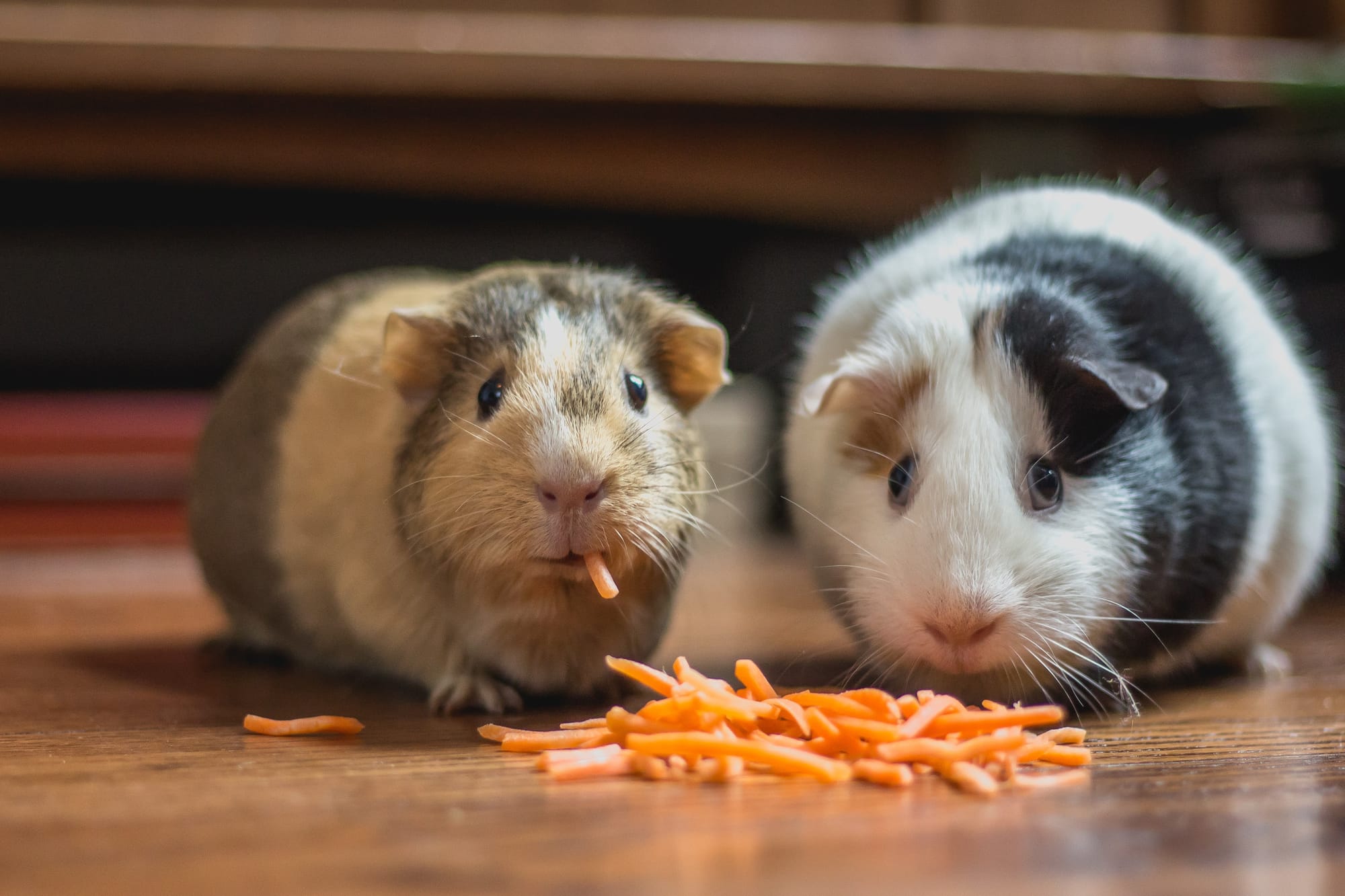
14. Nutritional Supplement Treats
Some treats are designed to be more than just a snack; they can also serve as a nutritional supplement. These may include added vitamins or omega-3 fatty acids to support your guinea pig’s overall health. Additionally, guinea pigs require vitamin C in their diet as they cannot produce it themselves, and they may need additional vitamin C if they are sick.
15. Fruit and Veggie Sticks
Delicious treats like fruit and veggie sticks are compressed snacks made from real fruits and vegetables. They can be a good source of vitamins and are often enjoyed by guinea pigs for their crunchy texture. Ensure they don’t contain any artificial colors or preservatives.
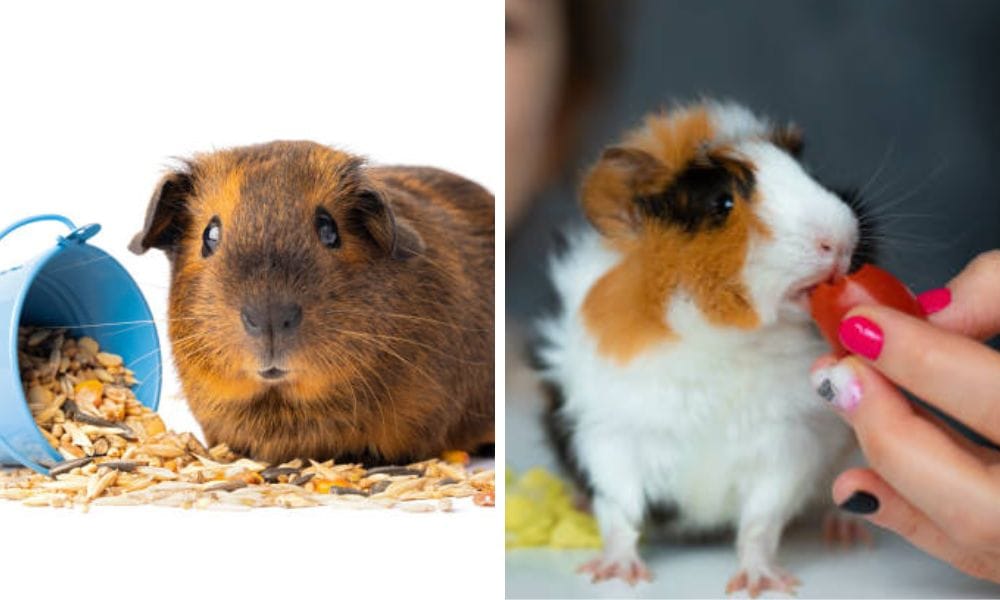
16. Hay and Herb Balls
Hay and herb balls are a combination of high-fiber grass hay and aromatic herbs, compressed into a ball shape. They can be hung in the cage to encourage foraging and play, providing both a treat and a form of entertainment.
17. Flower Treats
Certain edible flowers, like marigolds or rose petals, can be a delightful treat for your guinea pig. They are often sold in dried form and can add variety to your pet’s diet. Always ensure the flowers are pesticide-free and safe for consumption. Most guinea pigs enjoy flower treats.
18. Grain-Free Treats
For guinea pigs with sensitivities or to avoid excess grain in their diet, grain-free treats are available. These are often made with alternative ingredients like legumes or vegetables and can be a healthier option for some pets.
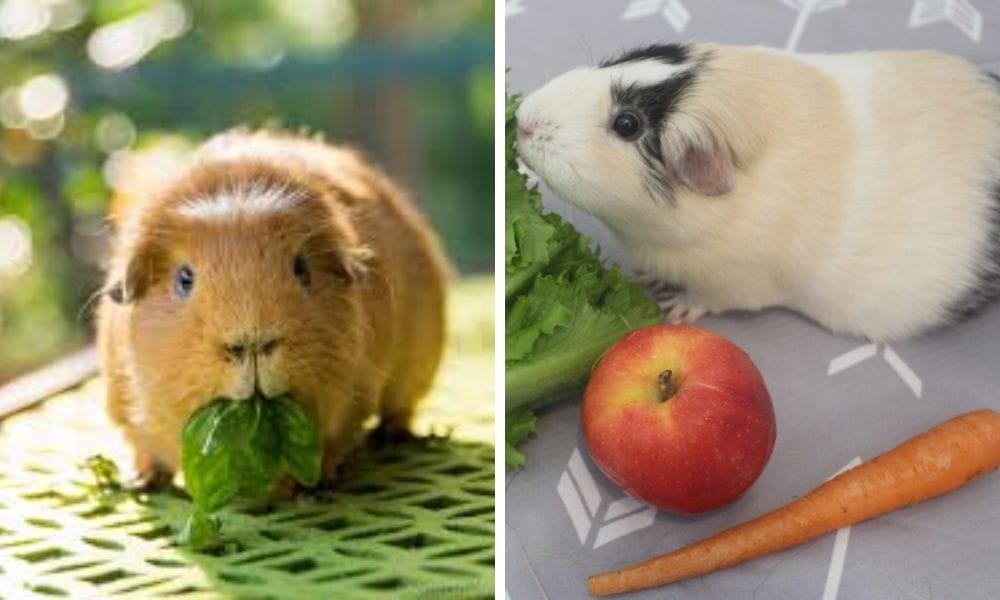
19. Chewable Vitamin Tablets
Chewable vitamin tablets are a direct way to ensure your guinea pig gets essential nutrients. They are often flavored to make them more appealing and can be a good way to provide vitamins like vitamin C via fresh veggies, Corn Gluten Meal, Vitamin E Supplement, stabilized Vitamin C, Ground Corn, Folic Acid, Ground Oats, Calcium Carbonate, Menadione Sodium Bisulfite Complex, Rosemary Extract, Riboflavin Supplement, Soybean Oil Zinc Oxide, Yucca Schidigera Extract, Choline Chloride, Sodium Selenitem Sodium Selenite, Ferrous Sulfate, etc
With added Vitamin C to help maintain a strong immune system.
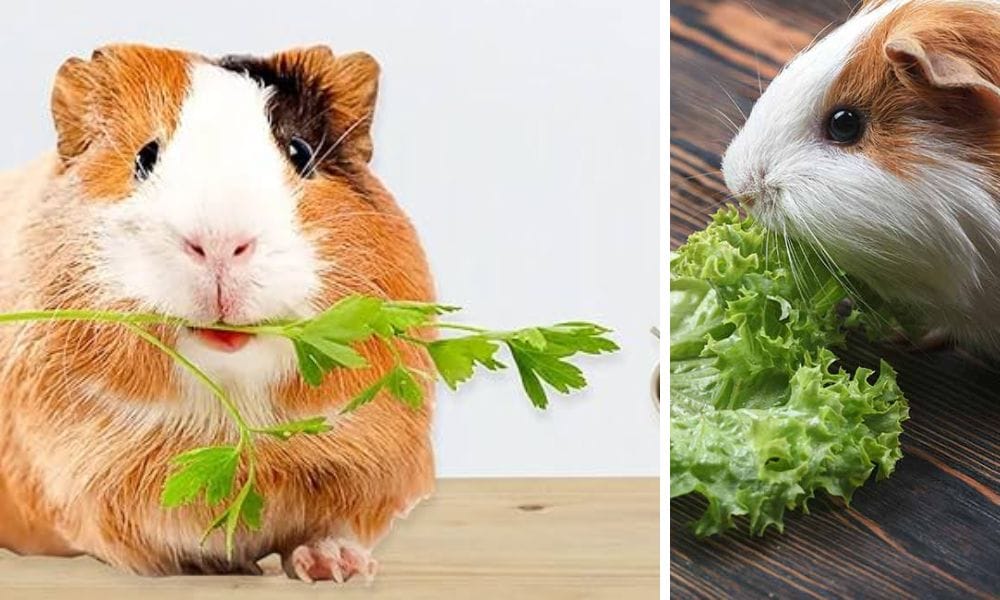
20. Forage Mixes
Forage mixes mimic the variety of plants a guinea pig would encounter in the wild. These mixes can include a range of dried leaves, grasses, and flowers, offering a natural and enriching snack that also promotes dental health.
Bonus#1 Small Pet Select Pet HairBuster Comb:
While this is not exactly a treat, it is a fantastic tool to ensure that your guinea pig doesn't get hairballs. As any guinea pig lover knows, hairballs can be a severe problem and can even be fatal. So, using this hair comb regularly can mitigate that problem. You can learn more about how to groom your guinea pig here.
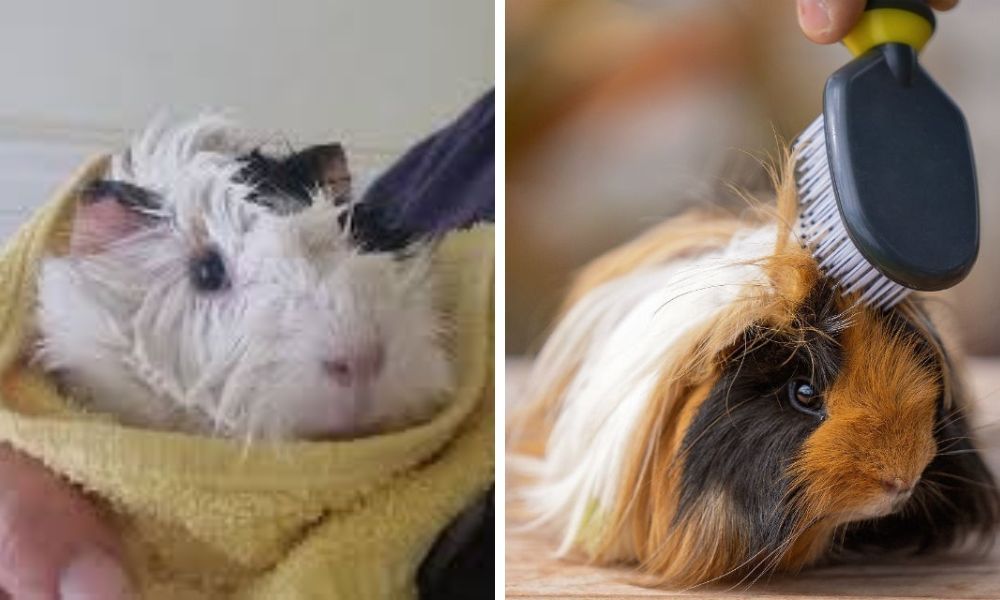
FAQ Section
Q: How often should I give my guinea pig treats?
A: Treats should be given in moderation, making up only a small portion of your guinea pig’s diet. A good rule of thumb is to offer treats a few times a week, not on a daily basis, to avoid issues like obesity and nutritional imbalances. Remember, the bulk of your guinea pig’s diet should consist of unlimited grass and hay, nutritionally complete healthy guinea pig pellets (with stabilized Vitamin C) and daily portion of fresh veg and fruit.
Q: Can guinea pigs have treats with added sugar?
A: It’s best to avoid treats with added sugar or artificial sweeteners. Guinea pigs do not need extra sugar in their diet, and it can lead to health problems like diabetes and obesity. Stick to natural, sugar-free options.
Q: Are there any treats I should definitely avoid giving my guinea pig?
A: Avoid treats that are high in fat, dairy, or contain chocolate, caffeine, or artificial sweeteners. These can be harmful to guinea pigs and cause digestive and other health issues. Always choose treats that are specifically designed for small animals and check the ingredient list.
Q: How important is diet in preventing bladder stones in guinea pigs?
A: Diet plays a crucial role in preventing bladder stones in guinea pigs. It's important to reduce or eliminate foods high in oxalates, provide adequate vitamin C, and offer specific types of hay, pellets, and vegetables. Avoid feeding high-calorie and high-calcium hays, as they can lead to obesity, abnormal calcification, and bladder stones.
Summary
Choosing the right treats for your guinea pig is essential for their health and happiness. The top 20 store-bought treats listed here offer a variety of flavors, textures, and nutritional benefits that can enhance your guinea pig's diet. Remember to feed treats in moderation, focus on natural and healthy options, and always consult with your veterinarian if you're unsure about a new treat. By providing a well-balanced diet and occasional treats, you can help ensure your guinea pig leads a long, joyful life.
If you are not sure which treat to go for, we have put together our list of top 5 treats for guinea pigs you can buy today! Tap the button below to see the list now!

